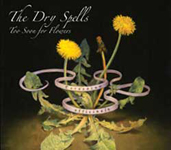|
|
 |
Dusted Reviews
Artist: The Dry Spells Album: Too Soon For Flowers Label: Antenna Farm Review date: Jul. 30, 2009 |

|
|
|
 |
The last song on the Dry Spells’ debut album, Too Soon for Flowers is a cover of “Rhiannon,” maybe the best known Stevie Nicks song in the whole Fleetwood Mac oeuvre. It’s a wicca-drenched exercise in alternative mythology, with a strong, self-reliant female character (who happens to be a witch). Among rock songs that got played on the radio at the time, it seemed fairly daring, a woman who chose exactly “who would be her lover,” and didn’t spend a lot of time moaning about whether he’d call or not afterwards. It was also balanced right on the cusp between folky intimacy and large-scale 1970s arena rock, its slithery modal melody climaxing in giant choruses, its shadowy verses punctuated by cart wheeling guitar riffs. It’s one of the few songs from 1976 that make perfect sense for a woman-led, fully autonomous folk rock band in the last months of the ’00s, and Dry Spells, out of San Francisco, do it proud.
Not a surprise maybe, because Dry Spells themselves are a bit witchy, a bit empowered, a bit ambivalent about whether they like the folk or the rock the best. Their Too Soon For Flowers works from roughly the same angle as Espers, roughing up achingly pretty folk melodies with effects-altered guitar leads and employing stringed instruments for color, tone and rhythm. (Like Espers, they do a version of “Black Is the Color,” though theirs is considerably breezier.) The band will inevitably be tagged as a Citay side project, since all five of its members (singer Tahlia Harbour, violinist April Hayley, guitarist Adria Otte, drummer Caitlin Pearce and bassist Diego Gonzales) have played in Ezra Feinberg’s main gig. However, Dry Spells actually predates Citay by a few years, and took shape when its four women musicians were at Bard College together. Plus, you would never mistake Dry Spells for Citay. Where Citay strings together extended sunlit guitar reveries and sometimes forgets about vocals at all, Dry Spells embellishes more structured, verse-chorus compositions with multiple female harmonies. There’s always a song going, even when the instrumentation becomes elaborate.
Consider, for instance, “Lost Daughter,” the album’s first track. It starts very quietly, just shaken percussion and a bass lick curving upward. The vocals are, at first, quiet restrained, two women in tight minor harmonies, singing folk-worthy lyrics about a wandering girl. And then, just about when the first verse closes, the song kicks things up, with hard drums, spiraling guitars and a lush thread of violin. The song becomes more rock without ever really giving up its folk essence – the girls are still singing close harmonies, the rhythms and chords still seem vaguely archaic – and yet it becomes a great deal more intense.
Songs range from relatively quiet (“Sruti,” “The Golden Vanity”) to all-out rock (“Batwood”) but even in the most extreme cases, lace their folk with rock and rock with folk. “Golden Vanity”’s serenity is scratched, just a bit, with the wah-induced twitchiness of its guitars. “Batwood”’s bass-thumping, hand-clapping drive is darkened by eerie washes of dopplering harmonies and reckless reels of fiddle. The ghostly figures of traditional folk lyrics – lost girls, suicides and such – weave their way through these songs, though the sound is never as downbeat as the words.
Every element of this record is impressive – the playing first rate, the songs accessible but without cliché, the producing (that’s Tim Green) sharp and clear. You get the sense that all five principals know a good deal about music, not just folk and rock, but classical, madrigal singing, raga and other styles, and have folded all these ideas seamlessly into a cohesive statement. That they are mostly women, in charge of their own self-expression and accustomed to seeing their ideas come across, is maybe not as remarkable now as it would have been for Stevie Nicks in 1976, but it is a very good thing, nonetheless.
By Jennifer Kelly
|







